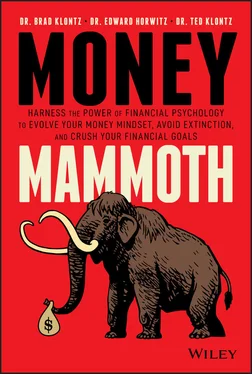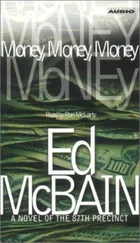Learn more about Dr. Brad Klontz at www.BradKlontz.com, his Money Mindset channel on YouTube www.YouTube.com/c/drbradklontzand @DrBradKlontzon social media.
DR. EDWARD HORWITZ, Ph.D., CFP ®, FBS, ChFC, CLU, CSA
During his 35-plus-year career in the financial services industry, Dr. Horwitz has educated tens of thousands of agents, financial planners, wealth managers, and consumers in the field of personal finance and risk management. He holds a Ph.D. from Kansas State University, an MBA from Creighton University, and an undergraduate degree in finance from the University of Iowa. In addition to his academic degrees, Dr. Horwitz also holds numerous professional designations in the fields of insurance risk management, financial planning, and applied financial behavior. Dr. Horwitz currently serves as the chief risk and compliance officer for Creighton University, holds the Inaugural Mutual of Omaha Endowed Chair in Risk Management, and is an associate professor of practice in the Economics and Finance Department at the Heider College of Business at Creighton University. Dr. Horwitz serves as the program director for Creighton's finance programs in enterprise risk management and was the developer and director for programs in financial planning and financial psychology and behavioral finance.
Dr. Horwitz is a regular industry speaker, author, media contributor, and applied financial psychology intervention researcher. His contributions have appeared in numerous national and local media outlets, in-print and online, including Money magazine, The Wall Street Journal , CNBC, and MSNBC. He is considered a creative leader, educator, and financial behavior futurist who brings his experience and academic research perspective to find unique solutions to consumer and organizations. Dr. Horwitz has provided advice and counsel to all likes of individuals from lower-income people struggling with debt issues, to Rock and Roll Hall of Fame musicians, members of the entertainment industry, professional athletes, and professional sport teams.
Dr. Horwitz's published research is focused on applied financial psychology-based solutions. He has authored several chapters in leading industry text books including Client Psychology (Wiley, 2018) and Financial Therapy—Theory, Research, & Practice (Springer, 2015). Dr. Horwitz is considered a leading industry contributor in the field of financial planning, behavioral change, financial psychology, and strategic enterprise risk management, both in his research and the breadth of his experience and practice. His insights and creative approaches to breaking through financial behavioral issues are highly respected.
Dr. Ted Klontz is an associate professor of practice at Creighton University's Heider College of Business and founder of the Financial Psychology Institute. He was a founding official of the Financial Therapy Association.
Ted has an extensive international private practice, including troubleshooting, strategic planning, advising, and consulting. He is a pioneer of and has been working in the field of financial psychology for over two decades, authoring six other books on the topic.
Our attitudes toward money and wealth have a far-reaching influence on how we live and lead our lives. Perhaps more so than any other aspect of our social development. In my case, as a boy growing up on a farm in northeast Nebraska, I saw my parents wrestle with farmland debt, soaring prices on farm equipment, and bankruptcies that made it nearly impossible to keep the family business afloat. Though we made it through, the impact of seeing that struggle forever changed the way I thought about money. It changed the way I foresaw achieving financial security and led me to a career as a financial advisor. Nearly 40 years later, I've built a top-ranked financial services firm serving tens of thousands of clients around the country, teaching them an undeniable truth about their financial behaviors: They underestimate the extent to which emotion plays a defining role in the success of their financial future.
Chances are you have your own story with your own unique values, life lessons and attitudes toward money. They've taught you some valuable lessons and probably exposed a few mistakes along the way, too. It's a relationship, really. We have our own connection with money that influences how we save it, invest it, or spend it. What is so profoundly powerful about this book is that it shines a light on how you develop these postures toward money and, more importantly, what you can do to adjust your own habits so you can make your financial situation work for you.
At Carson Wealth (carsonwealth.com), we help our clients pursue True Wealth TM, which is what we define as “all that money can't buy and death can't take away.” Using a holistic approach to financial planning and aided by technology, we discuss the emotions behind the decisions being made in a financial life. This experience connects the dots between life and wealth, making their financial situation easier to understand.
A top client of ours recently came into the office for her annual review and, as she and the advisor were getting caught up, she seemed flustered. Long-time friends, the advisor's and client's children went to school together. The advisor picked up on her uneasy position and asked if she was feeling okay.
She responded, “You've known me for a long time and we've trusted each other, so I'm going to be direct with you,” she replied. “I'm more scared coming in to see you than I am seeing my doctor.” Surprised, the advisor asked why.
“I just get nervous about money,” she continued. “At least with the doctor, I know my results are either positive or negative. When it comes to money, I don't know exactly where I stand, and I feel intimidated by this area of my life because of how little I know. I want to do what's best for my kids, but I don't understand any of this and it makes me really nervous.”
There are tens of thousands of stories just like this one. It underscores a scary reality about the psychological component interwoven into the fabric of our financial lives. Our anxiety over money is an issue that's as old as money itself.
So, where do you go from here? Start by recognizing that financial psychology is the future of financial planning. The author's make a solid case for this and brilliantly outlines how this issue is no longer simply an academic one. It's a personal one, and it will impact each of you in your own unique way. With every chapter, you'll be carried into a deeper layer of understanding of your own financial habits and, more importantly, equipped with an action plan on how you can make smarter decisions for your financial future.
Think about the numerous beliefs you have about money. How have they influenced you up to this point in your life? What healthier habits can you adopt going forward? How can you go about building a more secure financial life for yourself and your family, equipped with this knowledge? These are all questions that will be answered in-depth in Money Mammoth . My advice, as a financial advisor who sees just how far we've fallen when it comes to financial literacy, is to take these concepts and share them with everyone you know.
Really, that's what I see being so powerful about this book. It forces you to not only look at yourself holistically but also opens your eyes to the multi-faceted way money infiltrates your thinking, your desires, your attitudes and your future. If we intend to make smarter financial decisions and raise financially savvy children, this book makes it clear we must first start with ourselves. The more holistic your planning, the better your ability to make the right financial decisions.
Читать дальше












